一般疑问句变化规则
变一般疑问句
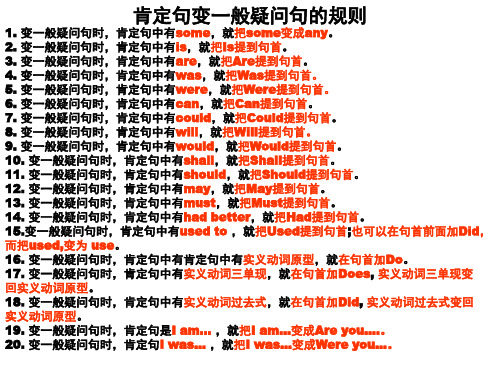
肯定句变一般疑问句的规则
变为一般疑问句
1. She is doing some cleaning. any Is she doing ________ _____ cleaning? 2. They were watching TV at this time yesterday. _____ ________ TV at this time yesterday? Were they watching 3. She goes bicycling twice a week. ______ Does she _____ go bicycling twice a week? 4. She has to clean the classroom every day. _____ Does she _____ have to clean the classroom every day? 5. She does morning exercises every day. _____ morning exercises every day? Does she _____do do 6. We did morning exercises yesterday. _____ Did you _____ do morning exercises yesterday? *7. Jim used to be a policeman. ______ Used Jim _____ to be a policeman?
变为一般疑问句
1. I am from Canada. _____ Are _____ you from Canada? 2. She is looking for her dog. _____ she __________ Is looking for her dog? 3. They are some knives. ______ they ______ Are any knives? 4. There were some birds in the tree two days ago. ______ Were there ______ any birds in the tree two days ago? 5. I would like to go with you. ______ Would you ______ like to go with me? 6. Maria does sports every day. _____ sports every day? Does Maria _____ do *7. You’d better go home at once. _______ you _______ better go home at oncehat 1)对不是人的物和事提问。 2)对前面出现了name的人名提问。 3)对数字本身提问。 4)对表示职业的名词(a doctor, a teacher 等)提问。 2. What do…do ?对动词原形提问。 3. What does…do? 对动词三单现提问。 4. What did…do? 对动词过去式提问。 5. What …doing? 对动词现在分词(v.ing)提问。 6. What …be the weather like…?或How …be the weather?对表示天气状况 的adj(如 sunny, cloudy, windy, rainy, foggy, snowy等)提问。 7. What color 对做表语、宾语的颜色提问。 8. What day 对星期几,节日,生日提问。 9. What date 对几月几日提问。 10. What time 对做表语、状语的时间点(如6:30 at 7:00PM等)提问。 11.What class/row/grade/school等对诸如:Class Four, Row Three, Grade Seven, No. 8 Middle School 的短语提问。 12. Who 对表示人的名词提问。 13. Why 对because +句子(because从句)提问。
陈述句变一般疑问句的规则
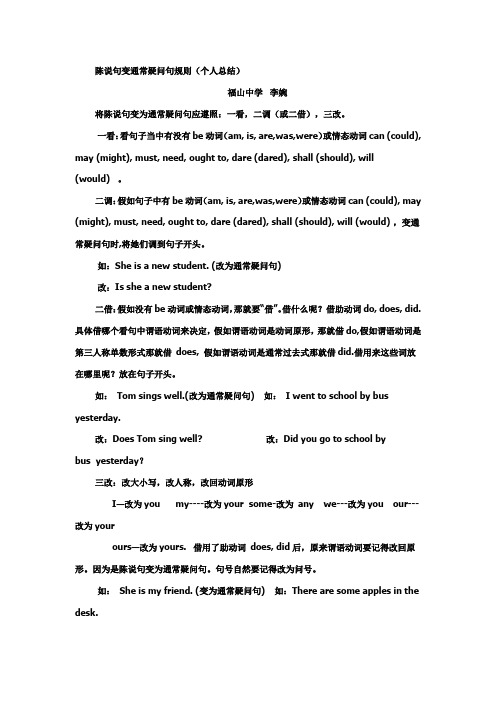
陈说句变通常疑问句规则(个人总结)福山中学李婉将陈说句变为通常疑问句应遵照:一看,二调(或二借),三改。
一看:看句子当中有没有be动词(am, is, are,was,were)或情态动词can (could), may (might), must, need, ought to, dare (dared), shall (should), will (would) 。
二调:假如句子中有be动词(am, is, are,was,were)或情态动词can (could), may (might), must, need, ought to, dare (dared), shall (should), will (would) ,变通常疑问句时,将她们调到句子开头。
如:She is a new student. (改为通常疑问句)改:Is she a new student?二借:假如没有be动词或情态动词,那就要“借”。
借什么呢?借助动词do, does, did.具体借哪个看句中谓语动词来决定,假如谓语动词是动词原形,那就借do,假如谓语动词是第三人称单数形式那就借does, 假如谓语动词是通常过去式那就借did.借用来这些词放在哪里呢?放在句子开头。
如:Tom sings well.(改为通常疑问句) 如:I went to school by bus yesterday.改:Does Tom sing well? 改:Did you go to school bybus yesterday?三改:改大小写,改人称,改回动词原形I—改为you my----改为your some-改为any we---改为you our---改为yourours—改为yours. 借用了助动词does, did后,原来谓语动词要记得改回原形。
因为是陈说句变为通常疑问句。
句号自然要记得改为问号。
如:She is my friend. (变为通常疑问句) 如:There are some apples in the desk.改:Is she your friend? 改:Are there any apples in the desk?备注:do 用于主语是第一人称或第三人称复数形式中。
陈述句变一般疑问句规则
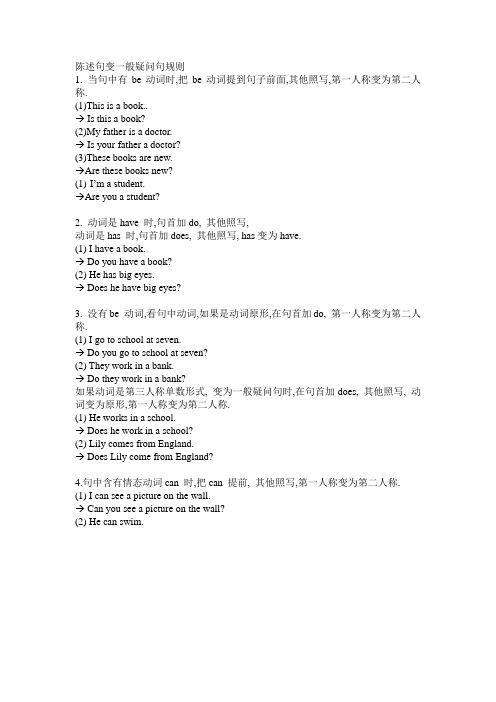
陈述句变一般疑问句规则1. 当句中有be动词时,把be动词提到句子前面,其他照写,第一人称变为第二人称.(1)This is a book..→ Is this a book?(2)My father is a doctor.→ Is your father a doctor?(3)These books are new.→Are these books new?(1)I’m a student.→Are you a student?2. 动词是have 时,句首加do, 其他照写,动词是has 时,句首加does, 其他照写, has变为have.(1) I have a book.→ Do you have a book?(2) He has big eyes.→ Does he have big eyes?3. 没有be 动词,看句中动词,如果是动词原形,在句首加do, 第一人称变为第二人称.(1) I go to school at seven.→ Do you go to school at seven?(2) They work in a bank.→ Do they work in a bank?如果动词是第三人称单数形式, 变为一般疑问句时,在句首加does, 其他照写, 动词变为原形,第一人称变为第二人称.(1) He works in a school.→ Does he work in a school?(2) Lily comes from England.→ Does Lily come from England?4.句中含有情态动词can 时,把can 提前, 其他照写,第一人称变为第二人称. (1) I can see a picture on the wall.→ Can you see a picture on the wall?(2) He can swim.。
陈述句变一般疑问句的规则
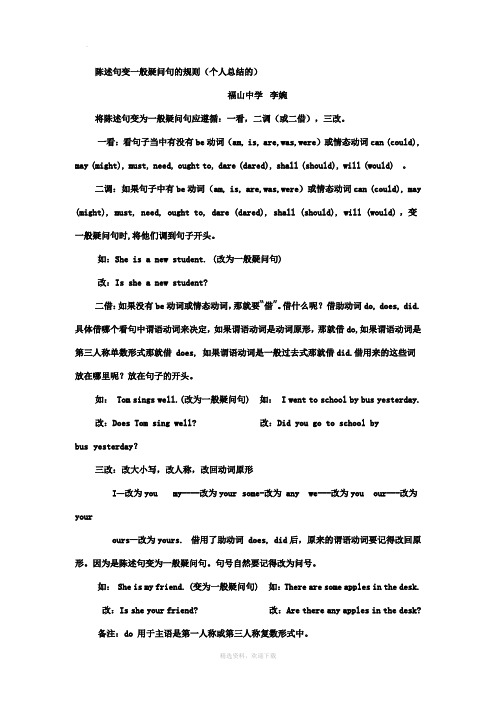
陈述句变一般疑问句的规则(个人总结的)福山中学李婉将陈述句变为一般疑问句应遵循:一看,二调(或二借),三改。
一看:看句子当中有没有be动词(am, is, are,was,were)或情态动词can (could), may (might), must, need, ought to, dare (dared), shall (should), will (would)。
二调:如果句子中有be动词(am, is, are,was,were)或情态动词can (could), may (might), must, need, ought to, dare (dared), shall (should), will (would),变一般疑问句时,将他们调到句子开头。
如:She is a new student. (改为一般疑问句)改:Is she a new student?二借:如果没有be动词或情态动词,那就要“借”。
借什么呢?借助动词do, does, did.具体借哪个看句中谓语动词来决定,如果谓语动词是动词原形,那就借do,如果谓语动词是第三人称单数形式那就借 does, 如果谓语动词是一般过去式那就借did.借用来的这些词放在哪里呢?放在句子的开头。
如: Tom sings well.(改为一般疑问句)如: I went to school by bus yesterday.改:Does Tom sing well?改:Did you go to school bybus yesterday?三改:改大小写,改人称,改回动词原形I—改为you my----改为your some-改为 any we---改为you our---改为yourours—改为yours.借用了助动词 does, did后,原来的谓语动词要记得改回原形。
因为是陈述句变为一般疑问句。
句号自然要记得改为问号。
如: She is my friend. (变为一般疑问句)如:There are some apples in the desk.改:Is she your friend?改:Are there any apples in the desk?备注:do 用于主语是第一人称或第三人称复数形式中。
肯定句变一般疑问句的注意点和规则
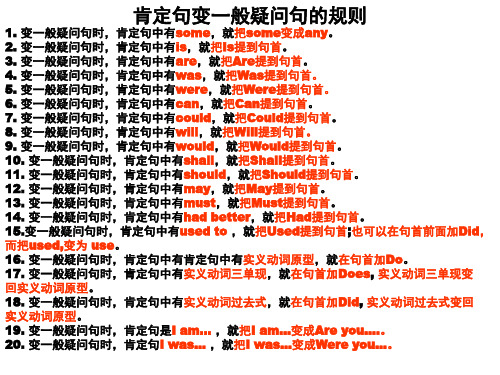
变为否定句
1. I am Maria’s friend. I _____ ______ Maria’s friend. am not 2. He was reading a novel in the study. wasn’t He ________ _________ a novel in the study. reading 3. Steve was doing some cleaning at this time yesterday. any Steve wasn’t doing ______ cleaningቤተ መጻሕፍቲ ባይዱat this time yesterday. ______ 4. He minds it. He doesn’t ______ it. _______ mind 5. Be quick. ______ be Don’t ______ quick. 6. Michael can speak some French.. Michael ______ speak ______ French. can’t any *7. I used to walk to school before. I _________ ______ walk to school before. usedn’t to
变为一般疑问句
1. I am from Canada. _____ _____ from Canada? Are you 2. She is looking for her dog. _____ she __________ for her dog? Is looking 3. They are some knives. ______ they ______ knives? Are any 4. There were some birds in the tree two days ago. ______ there ______ birds in the tree two days ago? Were any 5. I would like to go with you. ______ you ______ to go with me? Would like 6. Maria does sports every day. _____ Maria _____ sports every day? Does do *7. You’d better go home at once. _______ you _______ go home at once? better Had
一般疑问句变化规则

一般疑问句变化规则
1. 嘿,一般疑问句变化的时候,要是句子里有 be 动词,那就直接把
be 动词提到句首呀!比如“He is a student.”变成一般疑问句不就是“Is he a student?”这多简单呀!
2. 哇哦,句子里要是有情态动词,也很容易呀,照样把情态动词提到句首就行了!就像“She can sing.”变成一般疑问句就是“Can she sing?”很好玩吧?
3. 哎呀,要是既没有 be 动词又没有情态动词,那可就得借助助动词啦!像“I like music.”得借助do 变成“Do you like music?”是不是很神奇呢?
4. 嘿,别忘了第三人称单数的时候,助动词要用 does 哦!比如说“He goes to school every day.”变成一般疑问句就是“Does he go to school every day?”这可得记住啦!
5. 哇,还有哦,如果句子中有否定词,在变一般疑问句的时候要去掉否定词哟!像“She doesn't like dancing.”变成一般疑问句就是“Does she like dancing?”很有意思吧!
6. 哈哈,最后呀,要注意一般疑问句的回答呀,要用 yes 或 no 来开头呢!就好像人家问你“Do you have a pen?”你就得回答“Yes, I do.”或者“No, I don't.”是不是挺有趣呢?
我的观点结论就是:掌握一般疑问句变化规则其实并不难呀,只要多练习,大家肯定都能轻松学会!。
陈述句变一般疑问句的变法规则

原句
一般疑问句
He?likesfootball.
Doeshelikefootball
Jimhasaruler
DoesJimhavearuler
Evewantstowatchfootballgames.
DoesEvewanttowatchfootballgame
5.当陈述句的时态为过去时,句子中没有be动词时,主语为一、二、三人称时,句首加“Did”,动词变原型,句号变问好,其他不变。
当陈述句的时态为过去时句子中没有ebe动词时主语为一二三人称时句首加did动词变原型句号变问好其他不变
陈述句变一般疑问句的变法规则
用来叙述一件事或表明说话人的看法、态度等的句子称为陈述句。句末为句号,一般读作降调;用"Yes"或"No"来回答的疑问句叫一般疑问句。一般读作声调。小学阶段陈述句句型比较简单,只要记住变化规则,做起来就非常简单。下面浅谈一下陈述句变一般疑问句的变化规则。
Iwasstudent8yearsago.
Wereyoustudent8yearsago
2.以"Iam……"和"Weare……"开头的句子,把"Iam……"和"Weare……均变成"Areyou……?"句号变问号,其他单词不变。
例如:
原句
一般疑问句
Iamateacher.
Areyouateacher
1.句中有"is、are或can"的句子,把"is、are或can"提到句首,若句子为过去时,则将相应的变为过去时(was,werecould),句号变问号。
例如:
原句
否定句和一般疑问句的变化规则
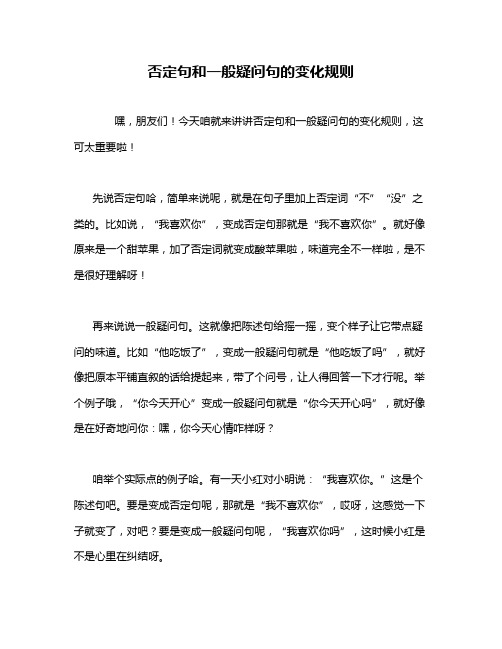
否定句和一般疑问句的变化规则
嘿,朋友们!今天咱就来讲讲否定句和一般疑问句的变化规则,这可太重要啦!
先说否定句哈,简单来说呢,就是在句子里加上否定词“不”“没”之类的。
比如说,“我喜欢你”,变成否定句那就是“我不喜欢你”。
就好像原来是一个甜苹果,加了否定词就变成酸苹果啦,味道完全不一样啦,是不是很好理解呀!
再来说说一般疑问句。
这就像把陈述句给摇一摇,变个样子让它带点疑问的味道。
比如“他吃饭了”,变成一般疑问句就是“他吃饭了吗”,就好像把原本平铺直叙的话给提起来,带了个问号,让人得回答一下才行呢。
举个例子哦,“你今天开心”变成一般疑问句就是“你今天开心吗”,就好像是在好奇地问你:嘿,你今天心情咋样呀?
咱举个实际点的例子哈。
有一天小红对小明说:“我喜欢你。
”这是个陈述句吧。
要是变成否定句呢,那就是“我不喜欢你”,哎呀,这感觉一下子就变了,对吧?要是变成一般疑问句呢,“我喜欢你吗”,这时候小红是不是心里在纠结呀。
对于否定句和一般疑问句的变化规则,真的要掌握好呀,不然说话表达可能就不准确啦!不管是在日常交流,还是学习写作中,都超级有用的呀!总之,一定要好好学起来,这样才能让我们的语言更加丰富、准确!这就是我的看法,你们觉得呢?。
- 1、下载文档前请自行甄别文档内容的完整性,平台不提供额外的编辑、内容补充、找答案等附加服务。
- 2、"仅部分预览"的文档,不可在线预览部分如存在完整性等问题,可反馈申请退款(可完整预览的文档不适用该条件!)。
- 3、如文档侵犯您的权益,请联系客服反馈,我们会尽快为您处理(人工客服工作时间:9:00-18:30)。
一般疑问句也叫Yes/No问句,变化规则如下:
1.句子中有be动词时,将be动词提前,首字母变大写,句末用问号。
例: He is a teacher. Is he a teacher?
You are a boy. Are you a boy?
2.句子里有情态动词can(能;会)时,将can提前,首字母变大写,句末用问号。
例:He can swim. Can he swim?
You can play football. Can you play football?
3.句子里没有be动词和can 时,要借助助动词do/does, 将do/does提前,句末用问号。
例:I like apples. Do you like apples?
He has a pen. Does he have a pen?
*回答的时候,用什么文就用什么回答,问的谁就用谁回答。
练习题:将下列句子变为一般疑问句。
1.I am a girl.
__________________________________________________
2.He is a cook.
___________________________________________________
3.They are teachers.
___________________________________________________
4.Lily can sing a song.
___________________________________________________
5.She can skate.
___________________________________________________
6.I like dogs.
____________________________________________________
7.They have two books.
_____________________________________________________
8.He wants to fly a kite.
_____________________________________________________ 按要求回答问题:
1. A re you a doctor? (no/student)
__________________________________________________
2.Is she a nurse? (yes)
______________________________________________________ 3.Is Lily a good student?(yes)
________________________________________________
4.Can you ride a bike? (yes)
_________________________________________________
5.Can he draw a picture?(no)
________________________________________________
6.Do they like bananas? (yes)
_________________________________________________
7.Does he have a ball? (yes)
__________________________________________________
8.Does Jack like to play football?(no)
_____________________________________________
9.Is Jack a doctor?(no)
_____________________________________________________ 10.Do you have an eraser?(no)
_______________________________________________________。
